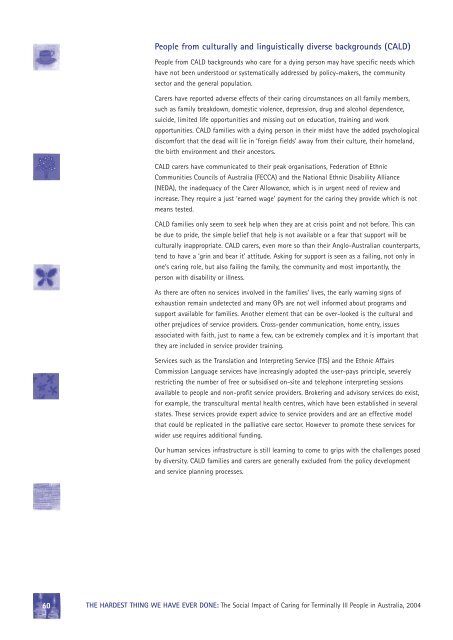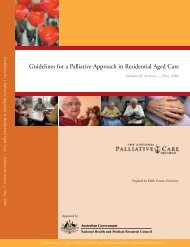The hardest thing we have ever done - Palliative Care Australia
The hardest thing we have ever done - Palliative Care Australia
The hardest thing we have ever done - Palliative Care Australia
Create successful ePaper yourself
Turn your PDF publications into a flip-book with our unique Google optimized e-Paper software.
People from culturally and linguistically diverse backgrounds (CALD)<br />
People from CALD backgrounds who care for a dying person may <strong>have</strong> specific needs which<br />
<strong>have</strong> not been understood or systematically addressed by policy-makers, the community<br />
sector and the general population.<br />
<strong>Care</strong>rs <strong>have</strong> reported adverse effects of their caring circumstances on all family members,<br />
such as family breakdown, domestic violence, depression, drug and alcohol dependence,<br />
suicide, limited life opportunities and missing out on education, training and work<br />
opportunities. CALD families with a dying person in their midst <strong>have</strong> the added psychological<br />
discomfort that the dead will lie in ‘foreign fields’ away from their culture, their homeland,<br />
the birth environment and their ancestors.<br />
CALD carers <strong>have</strong> communicated to their peak organisations, Federation of Ethnic<br />
Communities Councils of <strong>Australia</strong> (FECCA) and the National Ethnic Disability Alliance<br />
(NEDA), the inadequacy of the <strong>Care</strong>r Allowance, which is in urgent need of review and<br />
increase. <strong>The</strong>y require a just ‘earned wage’ payment for the caring they provide which is not<br />
means tested.<br />
CALD families only seem to seek help when they are at crisis point and not before. This can<br />
be due to pride, the simple belief that help is not available or a fear that support will be<br />
culturally inappropriate. CALD carers, even more so than their Anglo-<strong>Australia</strong>n counterparts,<br />
tend to <strong>have</strong> a ‘grin and bear it’ attitude. Asking for support is seen as a failing, not only in<br />
one’s caring role, but also failing the family, the community and most importantly, the<br />
person with disability or illness.<br />
As there are often no services involved in the families’ lives, the early warning signs of<br />
exhaustion remain undetected and many GPs are not <strong>we</strong>ll informed about programs and<br />
support available for families. Another element that can be over-looked is the cultural and<br />
other prejudices of service providers. Cross-gender communication, home entry, issues<br />
associated with faith, just to name a few, can be extremely complex and it is important that<br />
they are included in service provider training.<br />
Services such as the Translation and Interpreting Service (TIS) and the Ethnic Affairs<br />
Commission Language services <strong>have</strong> increasingly adopted the user-pays principle, s<strong>ever</strong>ely<br />
restricting the number of free or subsidised on-site and telephone interpreting sessions<br />
available to people and non-profit service providers. Brokering and advisory services do exist,<br />
for example, the transcultural mental health centres, which <strong>have</strong> been established in s<strong>ever</strong>al<br />
states. <strong>The</strong>se services provide expert advice to service providers and are an effective model<br />
that could be replicated in the palliative care sector. Ho<strong>we</strong>ver to promote these services for<br />
wider use requires additional funding.<br />
Our human services infrastructure is still learning to come to grips with the challenges posed<br />
by diversity. CALD families and carers are generally excluded from the policy development<br />
and service planning processes.<br />
60 THE HARDEST THING WE HAVE EVER DONE: <strong>The</strong> Social Impact of Caring for Terminally Ill People in <strong>Australia</strong>, 2004
















